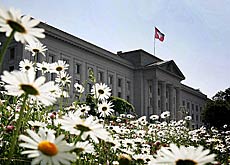Switzerland a cog in massive tax fraud scam

Criminal gangs appear to be increasingly using Switzerland in schemes to defraud European Union countries out of billions of euros in value added tax (VAT) receipts.
Switzerland’s secrecy laws on tax and close proximity to EU countries make it a prime location to funnel mobile telephones and computer chips through a process known as “carousel” fraud.
A recent British-German customs operation uncovered caches of mobile phones and other equipment being brought into Germany from Switzerland.
But investigators complain they are being denied vital information from the Swiss authorities which have yet to ratify a new anti-fraud treaty with the EU.
Swiss law prohibits the tax authorities from releasing information to other countries concerning tax evasion, which is not a crime in Switzerland.
Since the late 1990s fraudsters have been taking advantage of the fact that the movement of goods between EU countries is VAT-free.
Gangs import goods from one EU country to another free of duty, sell them to a partner company in the second country without handing over VAT to the authorities and then export them back out, claiming a tax refund.
The EU estimates that if this fraud carries on unchecked it could eventually cost member states about ten per cent of their VAT revenues, approximately €100 billion (SFr157.6 billion).
Swiss connection
Criminals have recently begun moving goods through Switzerland and other countries outside the EU to put investigators off the scent. They are then sent back to the EU to repeat the process – hence the term carousel.
“Switzerland has figured in the past in respect of movements of [fraudulent] money, but not significantly in the movement of goods,” British customs spokeswoman Sandra McKay told swissinfo.
“It began to feature increasingly last summer when trade figures showed that trade to third countries, including Switzerland, began to outstrip trade within the EU.”
McKay added that a strengthening of border checks has resulted in a drop in this activity, but getting evidence of criminal activity inside Switzerland remains a problem.
EU accord
A new Swiss-EU treaty designed to tackle such fraud by exchanging information is on the table, but has not yet been ratified by Switzerland.
“[At the moment] the [Swiss] tax authority is precluded by Swiss law from providing information on tax matters,” McKay said.
“Ratification of the EU-Swiss fraud agreement will be an important element in combating not just [this] fraud but any fraud that affects the financial interests of the European Community.”
Swiss customs and excise authorities admit the use of Switzerland as a link in the criminal chain is a problem.
“According to our information part of the goods in question move through Switzerland, but other third countries are also used,” said spokesman Serge Gumy.
He added that several past agreements with the EU have partially freed up the flow of information from Switzerland, but could not say when the new anti-fraud treaty would come into force.
swissinfo, Matthew Allen
Tax evasion is a civil misdemeanour rather than a criminal offence in Switzerland and evaders seeking refuge in Switzerland will not be extradited.
However tax fraud is a crime in Switzerland if it can be proved the evader falsified documents.
The carousel tax scam is also known as Missing Trader Intra-Community (MTIC) fraud.
Britain estimates that it lost some £1.9 billion (SFr4.44 billion) in the 2004-5 tax year as a result of this scam.
Crooks use a VAT-registered company (A) to ship goods from France to Britain – a legal process that does not attract tax.
Once in Britain, the goods are then sold from company A to company B, which is also part of the conspiracy, with VAT added to the selling price. This VAT payment gained by company A should then be handed over to the tax authorities, but the criminals operating this firm disappear, pocketing the cash.
The goods are exported on to another EU country by company B, allowing it to claim the VAT it paid to company A back from the British authorities.
The goods are next shipped to a country outside the EU to confuse investigators and then brought back into the EU, often with serial numbers changed, to repeat the process.

In compliance with the JTI standards
More: SWI swissinfo.ch certified by the Journalism Trust Initiative












You can find an overview of ongoing debates with our journalists here . Please join us!
If you want to start a conversation about a topic raised in this article or want to report factual errors, email us at english@swissinfo.ch.